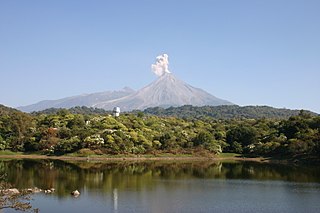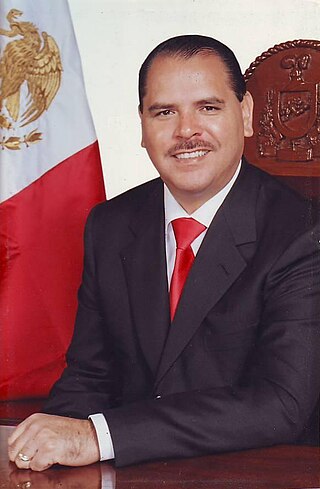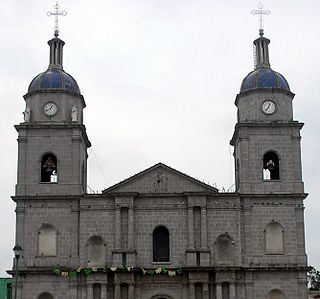
Colima, located in central−western Mexico, is the capital of the state of the same name and the seat of the municipality of the same name. It is located near the Colima volcano, which divides the state from Jalisco. Colima is the state's second largest municipality by population after Manzanillo.

Colima, officially the Free and Sovereign State of Colima, is among the 31 states that make up the 32 Federal Entities of Mexico. It shares its name with its capital and main city, Colima.

The Volcán de Colima, 3,820 m (12,530 ft), also known as Volcán de Fuego, is part of the Colima Volcanic Complex (CVC) consisting of Volcán de Colima, Nevado de Colima and the eroded El Cántaro. It is the youngest of the three and as of 2015 is one of the most active volcanoes in Mexico and in North America. It has erupted more than 40 times since 1576. One of the largest eruptions was on January 20–24, 1913. Nevado de Colima, also known as Tzapotépetl, lies 5 kilometres (3.1 mi) north of its more active neighbor and is the taller of the two at 4,271 meters. It is the 26th-most prominent peak in North America.

Colima is a state in West Mexico that is divided into ten municipalities. According to the 2020 Mexican census, it has the smallest population of all Mexico's states with 731,391 inhabitants, and is the fifth smallest by land area spanning 5,801.75 square kilometres (2,240.07 sq mi).

for the pseudonymous artist, see Therese Emilie Henriette Winkel

Elections in Mexico are held every 6 years to elect a president and every 3 years to elect a legislature. These elections determine who, on the national level, takes the position of the head of state – the president – as well as the legislature.

Gustavo Alberto Vázquez Montes was a Mexican politician. At the time of his death he was serving as the Governor of Colima, representing the Institutional Revolutionary Party (PRI).

An election for governor was held in the Mexican state of Colima on 6 July 2003, simultaneously with federal congressional midterm elections. Gustavo Vázquez Montes of the Institutional Revolutionary Party (PRI) was initially declared the winner, with 83,995 votes; second place went to the National Action Party (PAN) with 69,180, with the Party of the Democratic Revolution (PRD) in third place with 32,042. Following accusations of irregularities, the gubernatorial result was declared void by the state electoral authorities and an extraordinary election was held on December 7, 2003. Meanwhile, Carlos Flores Dueñas of the PRI served as interim governor.

According to the Political Constitution of the Free and Sovereign State of Colima, the exercise of the Executive Power of this Mexican entity is placed in a single individual, called the Constitutional Governor of the Free and Sovereign State of Colima who is chosen for a period of 6 years and is not eligible for reelection. The term of governor begins November 1 of the year of the election and finishes October 31 after six years have elapsed.

Pedro A. Galván was a Mexican general, 25th governor of the Mexican state of Colima (interim), and governor of the state of Jalisco.

The Congress of the State of Colima, or simply Congress of Colima, is the legislative branch of the government of the State of Colima. The Congress of Colima is a unicameral legislature.
Martha Leticia Sosa Govea is a Mexican politician from Colima affiliated with the National Action Party who has served as municipal president (mayor) of the city of Manzanillo and as senator.
The 2003 Colima earthquake occurred on 21 January with a moment magnitude of 7.6 and a maximum Mercalli intensity of VIII (Severe). The epicenter was located on the Pacific coast in the Mexican state of Colima. The earthquake was felt as far away as Mexico City and in southern parts of the United States.

The University of Colima is a Mexican public university with several campuses across the state of Colima, bordering the Pacific Ocean. It was created on September 16, 1940 by the President Lázaro Cárdenas as People's University of Colima, and intended to serve the educational needs of the Michoacán, Jalisco, and Colima.
The Colima Cartel was a Mexican drug trafficking and methamphetamine producing cartel operating in Guadalajara, Jalisco. It was founded and led by José de Jesús Amezcua Contreras and supported by his brothers Adán and Luis.

Tuxpan is a town and municipality in the Mexican state of Jalisco. The name "Tuxpan" comes from the Nahuatl word tochpan, a word used to describe where rabbits live or possibly place of abundant rabbits. Some others translate it as a location above the river.
A local election was scheduled to be held in the Mexican state of Colima on Sunday, July 5, 2009. Voters went to the polls to elect, on the local level:

Mario Anguiano Moreno is a Mexican politician and member of the PRI who served as the Governor of Colima from 2009 to 2015. He also previously served as the municipal president of the state capital of Colima City and represented it in the state legislature.

Jorge Luis Preciado Rodríguez is a Mexican politician who used to be affiliated with PAN until his resignation from the party in 2023 after 27 years affiliated. He served as Senator of the LXII an LXIII Legislatures of the Mexican Congress representing Colima first minority. He also served as proportional representation Deputy during the LIX and LXIV Legislatures, as well as a proportional representation local deputy in the Congress of Colima during the LII and LV Legislatures. He was candidate for the governorship of the state of Colima in 2015, but lost by 511 votes to the PRI candidate Ignacio Peralta. He was the PAN candidate who came closest to achieving the state governorship.
Gonzalo Castellot Madrazo was a Mexican broadcaster, station owner and politician. He served three times in the Chamber of Deputies and was particularly involved in the development of broadcasting in the state of Colima.













